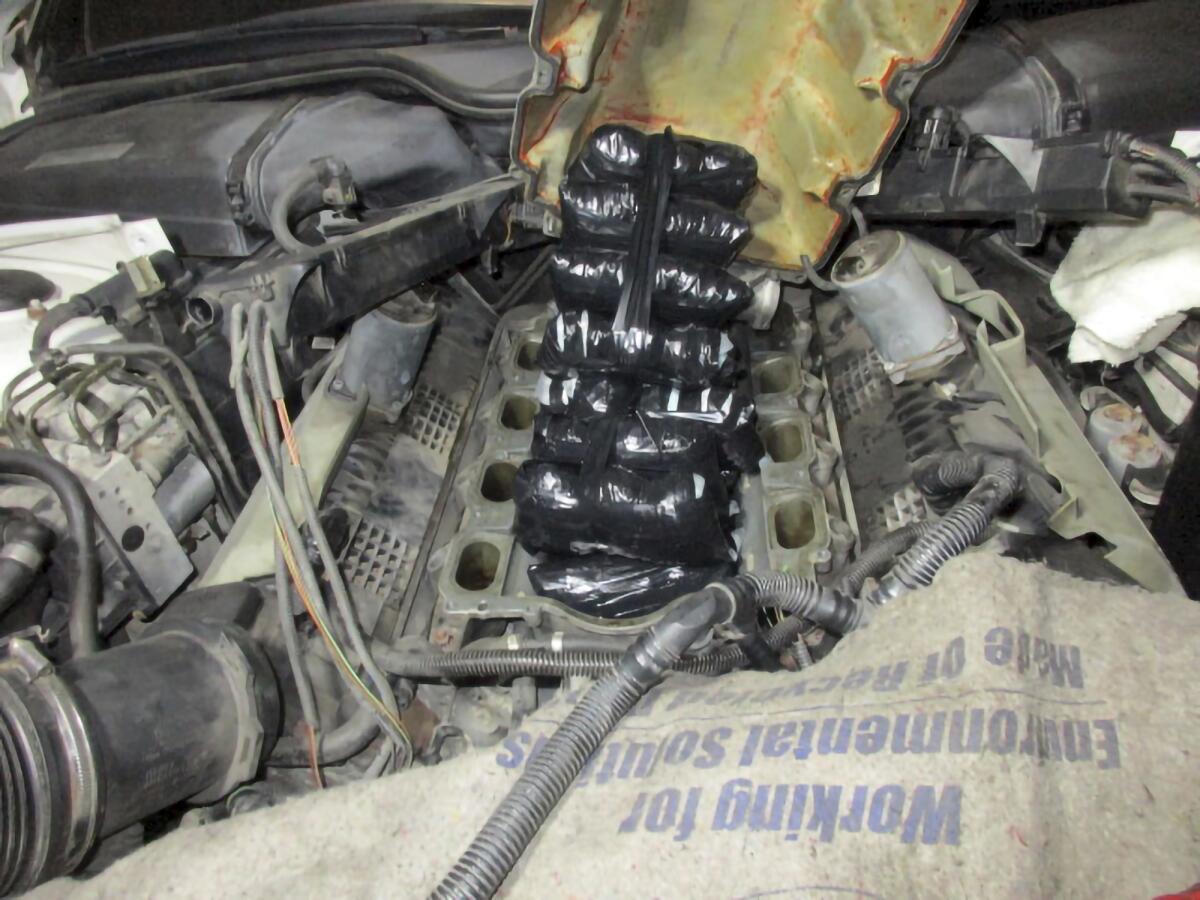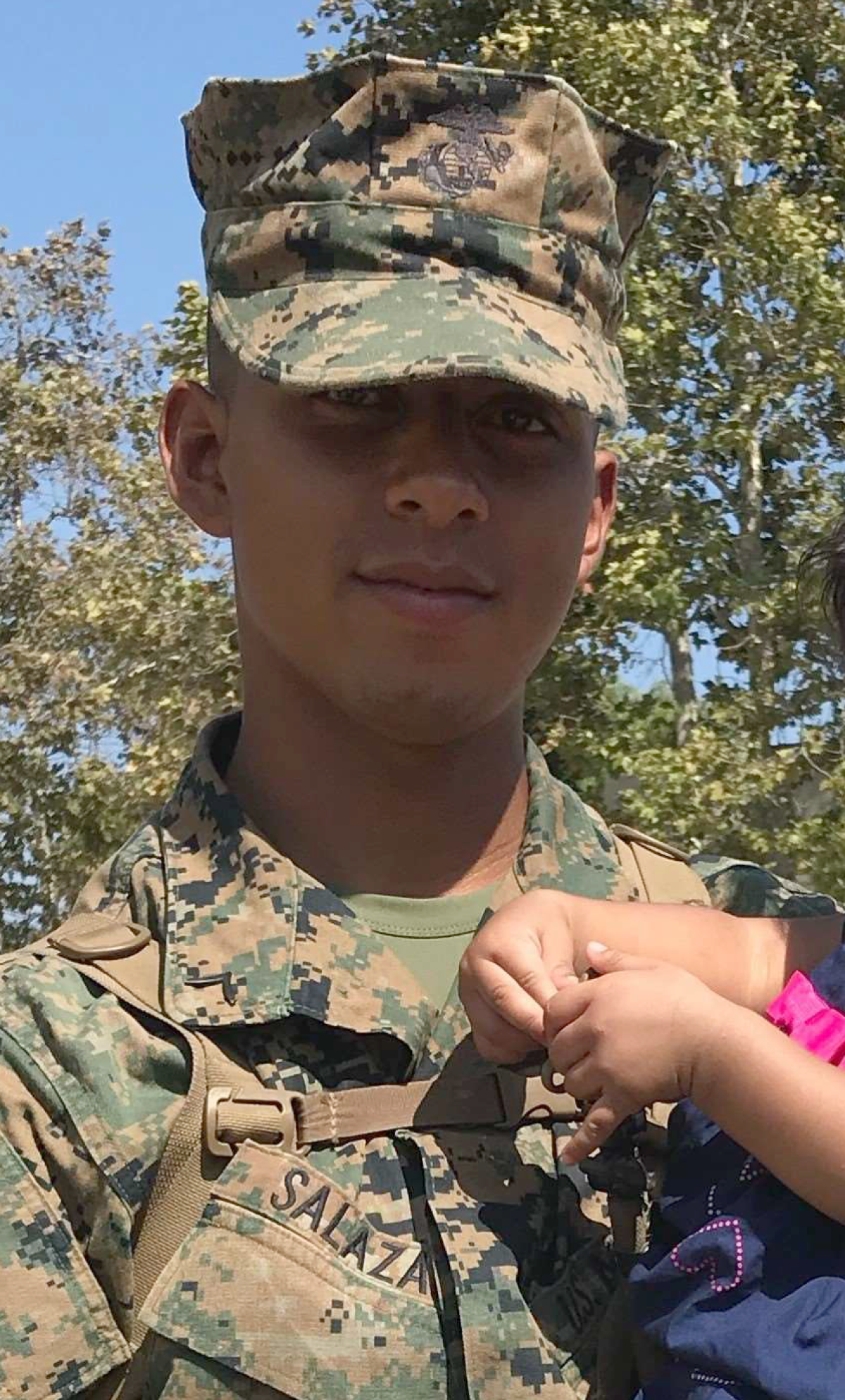Former Miramar Marine gets 12 years in prison for drug trafficking on active duty

- Share via
In the summer of 2020, a young man from San Diego who was running a cross-border drug-trafficking cell tried to commission a narcocorrido — a drug ballad — about his exploits. He wanted the song to contain lyrics about his abilities as a soldier — not as a cartel gunman, but as a United States Marine.
Two years later, while still on active duty in the Marine Corps, Roberto Salazar II was arrested on several drug-trafficking charges. He eventually pleaded guilty to two felony counts, and on Friday U.S. District Judge Janis Sammartino sentenced Salazar to 12 years in prison.
“Roberto Salazar served as a Marine, but he was also leading a secret life as a drug trafficker and a leader of a drug-trafficking organization,” U.S. Attorney Randy Grossman said Friday morning outside the downtown federal courthouse. “He was supposed to be protecting and defending our country, but instead he was bringing tremendous harm to Americans by importing fentanyl and other deadly, dangerous drugs into the United States.”
Assistant U.S. Attorney Robert Miller told Sammartino that Salazar, 26, ran a prolific drug-trafficking cell for many years, both before and after he joined the Marine Corps in 2018. Salazar admitted in his plea agreement to recruiting two recently discharged Marines to smuggle drugs across the border.
His service, mostly at Marine Corps Air Station Miramar as a radio operator, “was just a costume,” Miller said. “It was just a front.”
Defense attorney Andrew Nietor said his client was immersed in the drug world by Roberto Salazar I, his father who was “both abusive and absent.”

According to court documents and statements from both the prosecutor and defense attorney, the elder Salazar was deported to Mexico when his son was about 9 or 10 years old. The younger Salazar split time between the U.S. and Tijuana. He began smuggling — first humans, and then heroin — in 2013, around the time he was 16 years old.
Nietor said his client left that world for several years but went back to it for financial reasons after gaining full custody of his young daughter while living on the wages of an enlisted Marine.
“Because of his history with that organization, he was expected to pick up where he left off — and he did,” Nietor said. He told the Union-Tribune that his client “accepted personal responsibility for his actions, to an extent not often seen in these circumstances.”
Miller argued that Salazar never stopped being involved in drug trafficking, except during boot camp, pointing to the narcocorrido being commissioned at a time he was supposedly no longer involved in the trade. One of the lyrics Salazar suggested to the Mexican musician, according to prosecutors: “I wanted to study and became a soldier, but I liked the fast life better.”
According to his plea agreement, in 2015 Salazar recruited a classmate at Southwestern College in Chula Vista to help him smuggle drugs. In April of the next year, that classmate drove a car loaded with more than 5 pounds of cocaine and more than 20 pounds of methamphetamine through the San Ysidro Port of Entry.
Salazar continued recruiting, managing and paying couriers for years, according to his plea agreement. He sometimes drove the cars himself from the U.S. to a specific auto shop in Tijuana, where others hid the drugs in the cars. According to court documents in his and his co-defendants’ cases, they used specific luxury sedans, usually BMWs. That was because of those cars’ “unique engine compartment,” according to the U.S. attorney’s office.
In 2021, Salazar recruited two recently discharged Marines. The first smuggled drugs across the border on at least five occasions early that year. The second successfully moved drugs across the border on multiple occasions until he was caught in September of that year at the San Ysidro Port of Entry with more than 14 pounds of fentanyl stashed in his car.
During a news conference after the sentencing Friday, prosecutors declined to explain exactly how Salazar landed on the radar of law enforcement. But documents in the case offer clues as to when the net began tightening around him.
Over a four-day period in January 2022, Salazar was personally involved in a heroin deal gone bad inside a Las Vegas grocery store, though it’s unclear whether he was arrested immediately; one of his co-defendants was pulled over on Interstate 5 in Oceanside with more than 13 pounds of fentanyl in his car; the third co-defendant was stopped at the Otay Mesa Port of Entry with more than 17 pounds of fentanyl in his car.
Salazar told the judge that he “messed up,” saying his tough financial situation had led him back to his previous life as a drug trafficker.
“This is my first and last time I’m ever going to” be in trouble, he told Sammartino. While sentencing him, the judge told Salazar she was surprised he’d never been in legal trouble before because he was “very criminally sophisticated.”
Grossman, the U.S. attorney, declined to say whether Salazar’s trafficking cell was connected with any of Mexico’s large cartels.
In December, a woman who was an active duty soldier in the U.S. Army and her wife were arrested at the Otay Mesa Port of Entry after customs officers allegedly discovered more than 53 pounds of methamphetamine hidden in their car. Both women have pleaded not guilty in U.S. district court, but their cases are still pending. Both are out of custody on bail, and court documents indicate the soldier, who was based at Fort Campbell in Kentucky, has since left the Army.
Last year, Angel Dominguez Ramirez Jr. was sentenced to 16 years in federal prison for leading a large drug-trafficking cell with ties to multiple cartels, but prosecutors said his involvement started after he left the Marine Corps.
More to Read
Sign up for Essential California
The most important California stories and recommendations in your inbox every morning.
You may occasionally receive promotional content from the Los Angeles Times.














